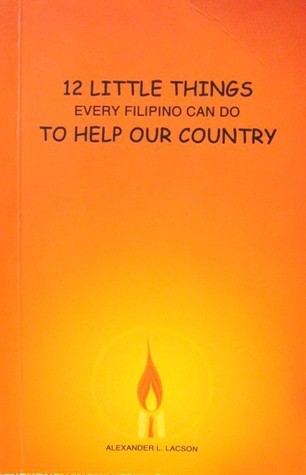What do you think?
Rate this book


103 pages, Paperback
First published January 1, 2005
In Psychology, experts agree that respect is one of the most basic needs of man. Every man wants and desires to be respected. Every man wants to be recognized. Every man desires to be values and honored.

One of the longest zip lines in the Philippines found in South Cotabato, where I lived for 16 executive years preserving nature and being nature friendly province in the south. I can't wait to ride the zip line again this coming December.
1. Follow traffic rules. - I do but not when it does not make sense like it is midnight and it is just a small intersection like the one in West and Baler and I can't see the reason why it has a stop light and so when no one is there except me I just beat the hell of the red light. Why should I waste my precious time for it to turn green. It's crazy!See? I don't regularly practice half of them. So, those who reviewed this book especially those who said they don't like this (preachy, in English, simple language, etc), are you following these 12 little things?
2. Ask for an official receipt. - If it is your officemate who is selling cakes or pastries, you don't do this because he does not even have his business registered in the first place. BTW, does the cash register receipt acceptable here?
3. Don't buy smuggled goods. - I buy pirated BluRay DVD's because they are a lot cheaper and the quality is good and they have subtitles and they come out right away once the movie has started its commercial run. Unlike the original DVD's. Tsk. Tsk.
4. Talk positively about our country. - I do this! CHECKED.
5. Respect your traffic officer. - I am not a perennial traffic violator so on those times that I got apprehended by a traffic officer? I thought I was in the right like I did not notice the inconspicuous no left turn in some kind of large intersection. So my reasons normally are acceptable so God have mercy on me, I just cannot accept the fact that I am being apprehended. So I argue and I normally win haha.
6. Do not litter. - I do this! CHECKED.
7. Support your church. - Which church? The one nearest to our house? It is located in the middle of shanties and there is a very small carpark and when you attend mass, you have to go out once in a while to check if you still have your side mirrors or all the four wheels are still there.
8. Vote. - Not during barangay elections when I don't even know who are those candidates! Or I sometimes skip some positions blanks because all the candidates are either not qualified or worse, are even crooks.
9. Pay your employees well. - Our katulong is happy with us.
10. Pay your taxes. - Automatic deduction - CHECKED!
11. Adopt a scholar or a poor child. - Worldvision and Unicef automatic deductions - CHECKED!
12. Be a good parent. - I always try to be - CHECKED! (Modesty aside)